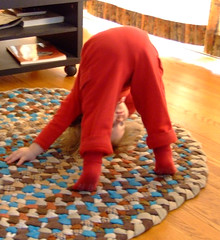Often when I pass along headlines it’s because I am blown away by what some parents have been taught to think about what is helpful to a child. These have been things like serving detention for them, teaching them to be fearful or what happens when bicycles and potholes meet.
But anything that can add to the overall hope and happiness that folks experience on Monday morning is irresistible. Thank you Gisele Grayson for the opportunity to pass on your NPR article about Teaching Kids to Take Healthy Risks.
In case you don’t have time to read it all right now here are some important points:
1) Risk-taking is normal and necessary. It’s how we learn to assess and take risks. Whether physical, financial, creative or another type, risk is something that will be a factor in our lives whether we want it to be or not.
2) This type of behavior is not about the parent! I’d like to be glib and say ‘enough said,’ however I have yet to find a way to be quiet when I have the opportunity to say that as the grown-ups in the equation we need to learn to separate OUR needs from our kids’ needs when making parental decisions. Sometimes doing what is right for our kids doesn’t not feel good.
3) Feeling the need to fit in can increase poor judgment. While this part of the article was about driving and graduated licenses, I couldn’t help thinking about some recent articles about bullying. Sure, everyone wants to fit in somewhere and some of the time, but young people who are confident about their own worth are less willing to damage themselves in order to have ‘friends.’ Kids who have been given the opportunity to bounce back learn that they can bounce back again and again.
4) Kids emulate parents’ style. Turn the magnifying glass around? Assess, recognize and assess our own shortcomings first??? Be still my heart.
5) Learning comes from balance of education and experience; through conversation not lecture……
What if it really is true that we can provide our children tools with which to think about a wide variety of situations rather than micromanaging their every move? What if the same thinking that helped protect them from bullying could keep them safer on the highway?
What if we can, in fact, prepare them for life as good grown-ups?
*points from original article paraphrased and italicized to separate my comments


